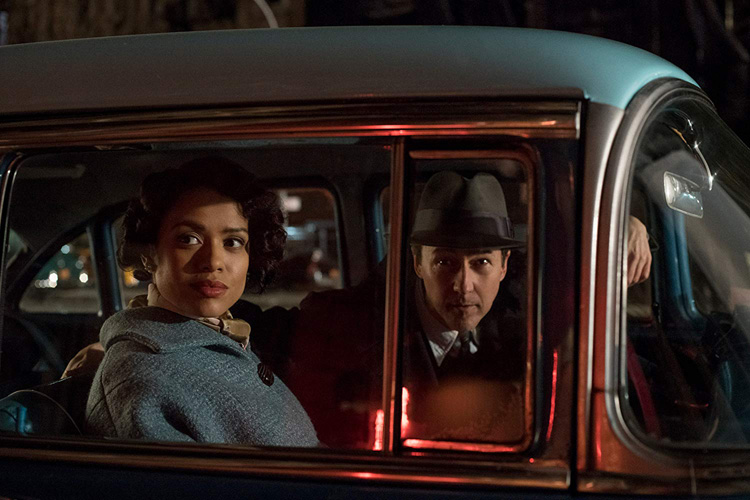Motherless Brooklyn is a 1999 novel that takes place in the 1999. The film rights were acquired in 2001, and now—after a nearly two-decade development—it’s a 2019 movie that takes place in the 1950s. What carried this story back and forth through time? Who kept the project alive all these years? Its existence can be largely attributed to one man: Edward Norton, consummate actor and (very) longtime fan of the novel.
Indeed, Norton snatched up the rights to a movie adaptation of Motherless Brooklyn shortly after the novel’s release, and worked hard to realize the project ever since. After doing some unglamorous favors—Norton recently joked that if you see him in roles that are “beneath him”, it’s because he’s paying the movie off—his Motherless Brooklyn is finally here. And even with a critical view of auteur theory, one could reasonably describe the movie as “his”: Norton directed, wrote, produced, and starred in this film adaptation. His artistic voice is all over it.
And so is his character’s voice! Norton plays Lionel Essrog, a private investigator with Tourette syndrome. He’s prone to tics and random shouting—not exactly pluses in the sleuthing business—but his affliction also gives him a perfect mind for the job. Like many Tourette’s sufferers, Essrog’s condition is paired with detail-oriented OCD, meaning that his mind is a steel trap for memories and clues. His detective abilities are put to the test when Frank Minna, his mentor and father figure, is killed for unclear reasons, leading Lionel down a road of dark secrets and hardboiled intrigue.
Despite Norton’s reverence for the source material, that’s pretty much where the movie’s similarities with the book end. The setup is the same—Lionel has Tourette’s, Frank dies, Lionel investigates—but everything following that is a completely different story. Norton said that he moved the setting to the 1950s so that the detective vibe wouldn’t feel “ironic” (which turned out to be the right call), but the transition to noir heyday also lets Norton play with themes that were absent from the novel. Where the book led to Mafiosos, an affair, and an evil Japanese corporation, the movie deals with racial politics and real estate developers.
While the latter elements have more contemporary resonance, making the intrinsic argument that America hasn’t changed for the better since the 50s, they also throw Motherless Brooklyn into identity crisis. The movie is so far removed from its source material that attempts to reconcile the texts feel perfunctory. Frank Minna, the genesis point of the narrative, ends up mattering very little to the movie: Lionel retraces Minna’s steps not into Minna’s past, but into an Edward Norton screenplay. Circling back to the plot of the book just gets in the way of the story that Norton ostensibly wants to tell. His eyes for storytelling are somewhat crossed.
But the more Norton trusts his revisions, the better the movie is. The 50s noir sheen, thick with morality play theatrics and a score to match, transports us to an American milieu that’s more familiar than anachronistic: corruption goes all the way to the top and spreads throughout the blueprint of Brooklyn, transforming every minute decision into an ethical quandary. How does one do the right thing when racism is built into the infrastructure of your city? ‘Built’ quite literally: antagonist Moses Randolph is closely based on Robert Moses, the racist developer who masterminded the gentrification of New York City. His addition to the story is domineering and Trumpian—he’s even played by Alec Baldwin—and it serves as a reminder that the genre’s trademark hopelessness is still present in our more colorful era.
Motherless Brooklyn balances its racial themes deftly. Norton repurposes Tourette’s into a metaphor for the marginalized experience: Lionel’s existence is conspicuous but his outcry is tuned out, as the intolerant around him sit back and wish for quiet neutrality. The allyship between him and Laura, a black activist played by Gugu Mbatha-Raw, is accordingly affective. What doesn’t come from the novel is so good that the rest feels like fluff—when the film extends well past the two-hour mark, one begins to wonder why it bothered being Motherless Brooklyn at all.
Even with the long runtime, the movie has trouble tying up its mess of threads, ending on a sudden note that’s only satisfying from a couple angles. Given the aptitude on display, one wishes that Norton applied his acting philosophy to the whole movie: sometimes, less is more.
★★★½ (3.5/5)




